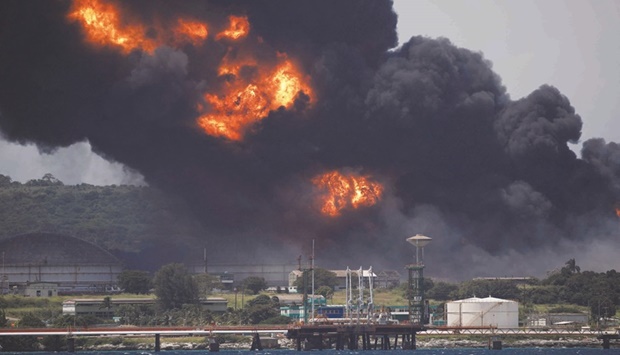A fire at a fuel depot in western Cuba sparked by a lightning strike has injured more than 60 people, three of them critically, officials said yesterday.
The official newspaper Granma attributed the fire, which began on Friday evening, to an “electric discharge” that struck a tank at the depot outside the city of Matanzas, 100km (62 miles) east of Havana.
The fire spread early yesterday from one fuel tank to a second, sending a huge plume of black smoke into the sky.
The Faustino Perez provincial hospital reported that 67 people had been injured, with 15 in serious or very serious condition.
And the Cuban presidency said 17 others, primarily firefighters, are listed as missing.
And some 800 people had been evacuated from the area, according to regional officials.
Health Minister José Angel Portal Miranda said in a Twitter post that of those injured, three were in critical condition, three very grave and another 12 were in a “grave” condition.
Seven patients were transferred to hospitals in the capital, Havana.
Cuban President Miguel Diaz-Canel and Prime Minister Manuel Marrero were supervising rescue efforts.
Upon hearing a first explosion, Yuney Hernandez and her family left their home just 2km from the depot, the 32-year-old mother told AFP.
They returned a few hours later.
However, around 5am yesterday (0900 GMT) they heard more explosions, “like pieces of the tank were falling”, she said.
President Diaz-Canel posted on Twitter before the second blast that first responders were “trying to avert the spread of the flames and any spill of fuel” into the Matanzas bay.
A later tweet from his office said Cuba was asking friendly nations for advice to put the fire out.
The journal Granma quoted a senior official of state-owned Cubapetroleo as saying that the fire was due to “a fault in the lightning-rod system, which could not withstand the energy from the electrical discharge”.
The depot supplies the Antonio Guiteras thermoelectric plant, but service to the plant has not stopped, the official said.
A paramedic at the scene, who asked not to be identified, said by telephone that cold water was being poured on nearby tanks.
The fire occurred at a time when the island – with an outdated energy network and persistent fuel shortages – has faced mounting difficulties in meeting increased energy demands amid severe summer heat.
Since May, the authorities have imposed energy blackouts of up to 12 hours a day in some regions – sparking at least 20 protests across the island’s interior.
Jorge Pinon, director of the University of Texas at Austin’s Latin America and Caribbean Energy and Environment Programme, said the area had eight big tanks each with a capacity of 300,000 barrels.
“The area is a transshipment point for fuel to various thermo-electric plants, not just the one nearby, so this could be very bad news for the power grid,” he said.

Fire is seen over fuel storage tanks that exploded near Cuba’s supertanker port in Matanzas.
